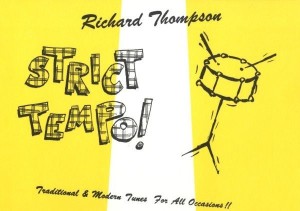 Lately, every time Richard Thompson issues a new recording, a spate of interviews appears in print and online media, conducted by writers of varying familiarity with his extensive oeuvre. Inevitably, one of more of them will ask him about his musical influences, and just as inevitably he’ll tell them they came from his father’s record collection. He then runs through a list, usually some variation of: Scottish traditional, pre-WWII jazz, Jimmy Shand dance records, Django Reinhardt, Louis Armstrong, and country & western. Thompson could just save his breath and hand them this record, Strict Tempo!
Lately, every time Richard Thompson issues a new recording, a spate of interviews appears in print and online media, conducted by writers of varying familiarity with his extensive oeuvre. Inevitably, one of more of them will ask him about his musical influences, and just as inevitably he’ll tell them they came from his father’s record collection. He then runs through a list, usually some variation of: Scottish traditional, pre-WWII jazz, Jimmy Shand dance records, Django Reinhardt, Louis Armstrong, and country & western. Thompson could just save his breath and hand them this record, Strict Tempo!
Originally released in 1981, it was produced during the slack period between the disappointing reception of Richard & Linda Thompson’s album Sunnyvista (their last on Chrysalis) and the re-recording of the songs that became Shoot Out the Lights following their original recording by producer Gerry Rafferty – a project that was unacceptably slick to Richard and therefore shelved. Until the 2004 release of his soundtrack album for Werner Herzog’s documentary film Grizzly Man, it was Thompson’s only instrumental album.
The album gets about a page-and-a-half in Patrick Humphries’ 1997 biography, and he describes it in words I wish I’d written:
The music which swirls around Strict Tempo sounds like being trapped inside a Harlem ballroom run by a jazz-loving Moor from the Scottish Highlands. Strict Tempo is the music of Thompson’s pre-pop recollection, filtered through the miasma of childhood memory – of holidays spent in Aberdeenshire, and of trying to emulate the swirl and skirl of the bagpipes on the electric guitar.
Thompson released the album as a one-off on his own vanity label called Elixir. The album cover art looks like it was done at RT’s kitchen table using a LetraSet or Chartpak kit and some hand-drawn graphics or cheap clip-art of musical instruments. In the U.S. it came out on an equally obscure label, Carthage, based in Rocky Hill, N.J. But then it got the semi-deluxe reissue treatment for its 30th anniversary in 2011 on Omnivore.
It’s a simple affair, as befits an album recorded in a couple of days on an eight-track deck at an unnamed studio somewhere in North London (again, according to Humphries, citing Dave Mattacks.) It contains 12 tracks, mostly arrangements of traditional Scottish and Irish tunes, an Irish parlor ballad, a couple of Moroccan tunes, and a Duke Ellington cover. The album is worth it for the Ellington tune, “Rockin’ In Rhythm,” alone. On two mandolins, mandocello, two acoustic guitars and drums, Thompson re-creates the Ellington band’s 1931 version with astonishing vibrance and veracity. You often hear other guitarists threaten to slit their wrists or just give up guitar after they hear Thompson play, but that’s usually in reference to his electric rave-ups or one of his more intricate acoustic pieces such as “1952 Vincent Black Lightning.” This … this is something else entirely.
Thompson plays all the instruments on the album except for drums and piano by Mattacks. That includes, in addition to acoustic and electric guitars, bass, banjo, mandolin, mandocello, hammered dulcimer, Dobro, pennywhistle, 12-string guitar and harmonium. The Moroccan track is called “Andalus/Radio Marrakesh,” consisting of two tunes played on mandolin, guitar and mandocello. It’s in contention for my second-favorite track, with the closer, called “The Knife-Edge.” This one consists of a slow air, a jig and a reel. This track appeared on the first RT career retrospective set, 1993’s Watching the Dark, and the first part of it was used on the aforementioned Grizzly Man soundtrack. So was the first section of a suite of Scott Skinner tunes that sits at Track 3, an air called “Glencoe.”
Looking back over this, I can’t believe I’ve spent so many words on what is in some ways a very slight album. But it’s all great fun, although I still have a hard time with the first two tracks, a set of Irish reels played on electric guitar in what Thompson calls “tradabilly” style,” and a set of polkas played on banjo. Both are somewhat redeemed by the subdued wheezing of the harmonium, though. And then there are the admitted “corny Scottish waltzes” played on Dobro and dulcimer, and more jigs and reels and hornpipes.
This reissue is packaged oddly, in an oversized piece of folding cardstock, which allows a little bit more room for Thompson’s added notes on the songs, although the rest of the liner notes remain in the original CD package’s hideously tiny typeface.
If you’re ever in need of a recording to amaze and confound your party guests and can’t find that old Rolf Harris LP, you need Richard Thompson’s Strict Tempo! Every aficionado should have a copy too, of course.
(Elixir, 1981; reissued by Omnivore, 2011)
